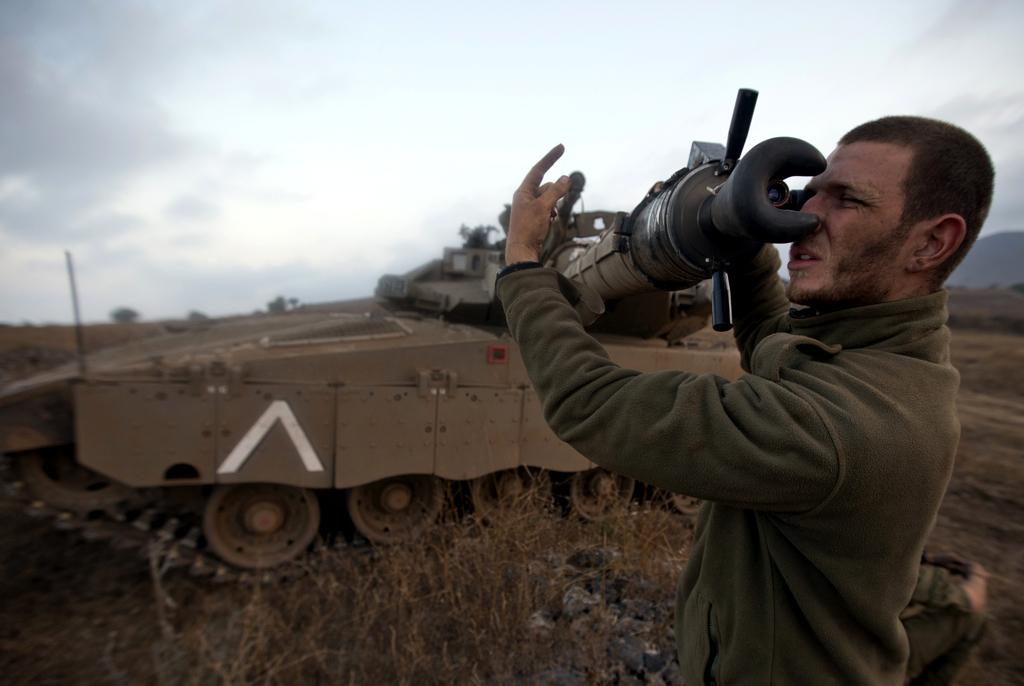Israel: Chemical weapons were used in Damascus attack
An Israeli soldier checks a Merkava tank during a military exercise in the Israeli-annexed Golan Heights near the border with Syria on July 18, 2013.
JERUSALEM — Israeli Prime Minister Benjamin Netanyahu responded today to reports of a deadly nerve gas attack that killed scores outside the Syrian capital yesterday with words of warning to the West.
"These events prove yet again that we simply cannot allow the world's most dangerous regimes to acquire the world's most dangerous weapons," he said in a statement Thursday, openly alluding to both Syria and Iran.
Syrian activists reported early Wednesday that hundreds had been killed when rockets loaded with chemical weapons were launched at Damascus’ eastern suburbs yesterday. Despite dozens of YouTube videos showing civilians twitching, foaming at the mouth and suffering from respiratory problems — symptoms, chemical weapons experts say, of nerve gas — no independent confirmation of nerve gas or other chemical was available, or of the number of fatalities.
Earlier Thursday, Israel’s minister of intelligence and strategic affairs Yuval Steinitz said that according to Israeli intelligence assessments “chemical weapons were used [in the previous day’s attack].”
“And of course not for the first time,” he told Israel Radio.
The apparent nerve gas attack leaves Israel in a quandary it hoped to avoid, in which it confronts a possible chemical war on its northern border while remaining tangential to the international arena in which the Syria discussions are taking place.
More from GlobalPost: Syria: The horrific chemical weapons attack that probably wasn’t a chemical weapons attack
Throughout the Syrian civil war, now in its third year, Israel has warned western countries about the potential danger of unsupervised Syrian chemical weapons stores, including sarin nerve gas and VX, a lethal agent Syria reportedly attempted to produce some 20 years ago.
With the number of possible victims ranging from about 150 to over a thousand, Israel Army Radio on Thursday broadcast the testimony of a Syrian doctor, speaking on an Arabic television channel, who said that he had seen at least 1000 dead just in his hometown of Zamalka.
The event occurred as UN chemical weapons inspectors were in Damascus, a situation deemed "absurd" by Netnayahu, who confirmed numerous previous reports that the inspectors are being "prevented from reaching the afflicted areas by the Syrian regime."
European leaders called on Assad to facilitate their immediate access. German Foreign Minister Guido Westerwelle joined his British and French colleagues in demanding that Syria free the inspectors to view the site.
“We are very worried about the reports that poison gas has been used near Damascus," he said. "These reports are very serious and if they are confirmed would be outrageous."
On Wednesday, Ake Sellstrom, the Swedish scientist who heads the team of UN chemical weapons inspectors in Syria, said that he had only seen TV footage of what had taken place.
Speaking with the Swedish news agency TT by phone from Damascus, he said: "it sounds like something that should be looked into. It will depend on whether any UN member state goes to the secretary-general and says we should look at this event. We are in place."
Formidable challenges await the UN team if they will be permitted to approach the area of Ghouta, in eastern Damascus, where the event took place. The Syrian army continued with a campaign of heavy bombardment of the region on Thursday.
No less significantly, say Israeli chemical weapons experts, nerve gas is almost impossible to detect after the fact.
Yiftah Shafir, a Senior Research Fellow at the Tel Aviv-based Institute for National Security Studies said if inspectors arrived onsite 36 hours after the attack, it is unlikely they would find any solid evidence.
“The problem is that if it was sarin gas, it’s a very volatile compound and it would probably have disappeared,” he said.
Forensic experts would be able to interview those affected and observe patients or even take blood samples, he said. But "it is of course impossible to tell who is responsible," he added.
Regardless, he said it was unlikely the event was fabricated.
“If you discount the possibility that it’s a fabrication, you have to come to the conclusion that something really terrible happened in Syria,” Shafer said.
“I don’t know what. It could even have been an accident that occurred during a conventional bombardment, maybe some sort of chemical installation was hit,” he said.
Every day, reporters and producers at The World are hard at work bringing you human-centered news from across the globe. But we can’t do it without you. We need your support to ensure we can continue this work for another year.
Make a gift today, and you’ll help us unlock a matching gift of $67,000!
